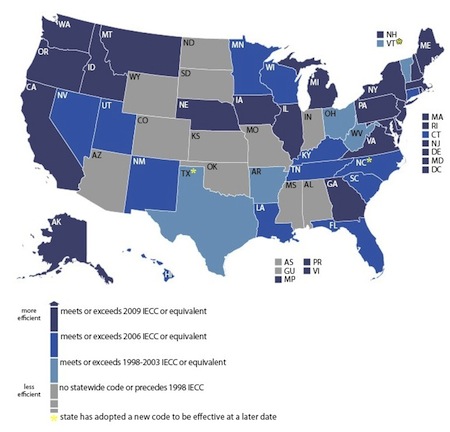Building Codes Assistance Project — Your Source for Energy Code Info

 I’ve been a big advocate of the 2009 International Energy Conservation Code (IECC) and its adoption by states. We adopted it here in Georgia last year, and it’s now fully in effect, including the requirement for Blower Door and duct leakage tests on all new homes built in the state.
I’ve been a big advocate of the 2009 International Energy Conservation Code (IECC) and its adoption by states. We adopted it here in Georgia last year, and it’s now fully in effect, including the requirement for Blower Door and duct leakage tests on all new homes built in the state.
I’ve been a big advocate of the 2009 International Energy Conservation Code (IECC) and its adoption by states. We adopted it here in Georgia last year, and it’s now fully in effect, including the requirement for Blower Door and duct leakage tests on all new homes built in the state.
One of my favorite sources for information about energy codes is the Building Codes Assistance Project, which keeps you updated on what’s going on in the world of codes through the Online Code Environment & Advocacy Network. And look, who among us doesn’t want to keep up to date on building codes?! You can hardly call yourself an energy geek if you don’t get their weekly Code Alert Bulletin. (See below.)
But it’s not just for energy geeks. They also work with Consumers Union (you know, the folks who publish Consumer Reports) to educate non-energy geeks on their consumer page. (I’m not a fan of that word, but Consumers Union clearly has a lot of investment in it.) Check it out.
BCAP-OCEAN is a joint initiative of the Alliance to Save Energy, the Natural Resources Defense Council, and the American Council for an Energy-Efficient Economy. They’ve been around since 1994, and, as stated on their website, their “goal has been to reduce building energy use by promoting the adoption, implementation and advancement of energy-efficient building codes and standards on the state and local levels and internationally.”
Providing good information is one way they do it. For example, if you don’t know what your state’s energy code is and how it relates to the IECC, you can go to their page of code status maps, where you can click on the map for commercial, residential, or global, and also see which states have an ongoing compliance project. The map below shows adoption of residential codes, where you can see that Georgia is one of two states in the Southeast that’s on the 2009 IECC! WooHoo! (Click on the map to go to a bigger, state-clickable version on their site.)
BCAP-OCEAN also publishes a weekly email Code Alert Bulletin, which you can sign up for by sending an email to Paul Karrer (pkarrer at ase dot org) and asking to be put on his list. The bulletin gives you code resources, general alerts, state alerts, and a calendar of code events.
Their website is great. Their info is great. Oh, yeah, they tweet, too. Follow them at @BCAPOCEAN.
This Post Has One Comment
Comments are closed.


Thanks for the references.
Thanks for the references. Good work.